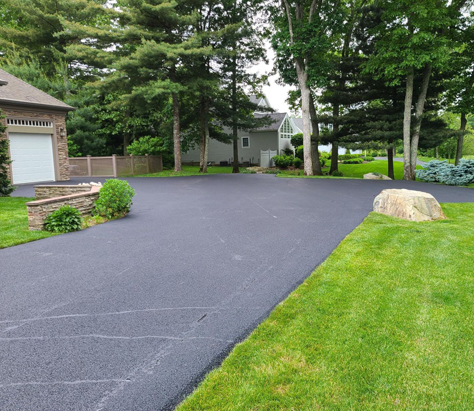Blog

Lot Milling & Pulverizing Explained: A Complete Guide for Property Owners
Why Parking Lot Repairs Aren’t Always Simple
When a parking lot starts showing cracks, rutting, or pooling water, many property owners assume the fix is a quick overlay. But surface damage often runs deeper than it looks. Beneath the asphalt may lie a weakened foundation that can’t support another layer of blacktop.
That’s where asphalt milling and pulverizing come into play. These methods are not cosmetic fixes — they’re part of how professional paving contractors rebuild durable, long-lasting surfaces without tearing out everything.
If you manage commercial property in Seekonk or Southeastern Massachusetts, understanding these repair options can help you protect your investment and budget wisely.
The Basics: What Each Term Actually Means
Before deciding which method your property needs, it’s important to understand what milling and pulverizing actually do.
Milling: Precision Removal
Asphalt milling involves grinding and removing the top layer of asphalt (usually 1–3 inches) while keeping the underlying base intact. Think of it as “resetting” your surface — shaving away the damaged layer to make room for a new, smooth overlay.
The result is a fresh top layer bonded to a solid foundation.
Milling is best for:
Parking lots with a strong sub-base but worn surface
Drainage corrections (adjusting slopes or leveling)
Fast, minimally disruptive resurfacing projects
Because it doesn’t disturb the foundation, milling is often faster and less expensive than full reconstruction — and it keeps operations running with minimal downtime.
Pulverizing: Deep Rehabilitation
Pulverizing, also known as full-depth reclamation, goes deeper. It grinds the entire asphalt surface and part of the base layer together to form a new blended foundation.
That reclaimed material is then graded, compacted, and used as the sub-base for new pavement. Essentially, the existing asphalt becomes the new structure beneath your lot.
Pulverizing is ideal when:
The asphalt surface and base are both failing
Drainage or elevation issues exist
The lot has widespread cracking or severe deformation
It’s more intensive than milling but still more cost-effective than tearing everything out. And since it reuses existing material on-site, it’s also an eco-friendly solution.
How Professionals Decide Which Method to Use
Not every lot needs the same fix — and guessing wrong can lead to early failure. When our team at All-Phase Asphalt Inc. evaluates a commercial property, we look at several key factors:
Sub-base strength: If it’s stable, milling will usually suffice.
Crack patterns: Deep “alligator” cracks signal foundation failure, pointing to pulverizing.
Drainage performance: Standing water or frost heave often means the slope or base needs correction.
Surface distortion: Warping or depressions indicate structural issues below the surface.
We often conduct a core sample test to see how the pavement layers are performing beneath the surface — a simple but critical step before recommending a method.
Step-by-Step: What Happens During Each Process
1. Inspection and Testing
Before work begins, contractors examine the surface and sub-base, sometimes drilling small cores to test moisture and density. This determines whether the foundation can be reused.
2. Milling or Pulverizing
Milling: Specialized machinery grinds off the surface asphalt in controlled passes. The milled material is conveyed into trucks to be recycled for future paving.
Pulverizing: A reclaimer machine grinds asphalt and base together, creating a rough aggregate mix that stays on-site.
3. Grading and Compaction
After either method, the surface is graded to restore proper slope for drainage, then compacted to create a uniform base.
4. Repaving
A new layer of hot-mix asphalt is laid, leveled, and rolled for a smooth, durable finish. For pulverized bases, a thicker layer is applied to ensure long-term stability.
Why It Matters for Property Owners
These two processes might sound technical, but their impact is simple: they determine how long your pavement lasts and how much you spend.
Milling gives your lot a fresh surface quickly — perfect when the structure below is still sound.
Pulverizing rebuilds the pavement from the ground up — solving deep-rooted issues once and for all.
In Massachusetts’ tough climate, ignoring base problems can shorten pavement lifespan by half. That’s why professionals evaluate more than what’s visible on the surface.
FAQs: Common Questions from Property Owners
Can milling fix drainage problems?
It can, to a degree. Adjusting how deep you mill helps restore proper slope, but if water sits due to poor grading or base failure, pulverizing may be required.
Is pulverizing too aggressive for small lots?
Not at all. Many small commercial or HOA lots benefit from partial-depth pulverizing, especially if there’s base damage limited to certain areas.
Will these methods disrupt daily business?
Milling projects often allow traffic within 24 hours. Pulverizing takes slightly longer but is still faster than full excavation.
Is recycled asphalt as durable as new material?
Yes. Properly compacted reclaimed asphalt base (RAB) can be just as strong, provided moisture and compaction are managed correctly.
When should I schedule this work in Seekonk?
Late spring through early fall is ideal. Warm conditions allow asphalt to compact and cure properly, ensuring the best bond and surface finish.
Local Expertise That Lasts
For over 30 years, All-Phase Asphalt Inc. has been helping businesses, HOAs, and municipalities across Seekonk and Southeastern Massachusetts extend the life of their pavement.
We don’t guess. We evaluate. Our technicians use laser grading, moisture testing, and experience-driven judgment to decide whether milling, pulverizing, or complete reconstruction will give you the best long-term value.
A strong parking lot isn’t just pavement — it’s your property’s foundation for curb appeal, safety, and functionality. With the right repair method, it’ll serve you well for decades.
Our Services
Helpful Links
License: RI 13328
© 2025 All Rights Reserved | All-Phase Asphalt Inc
